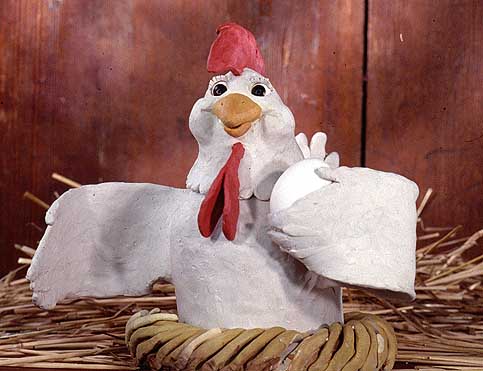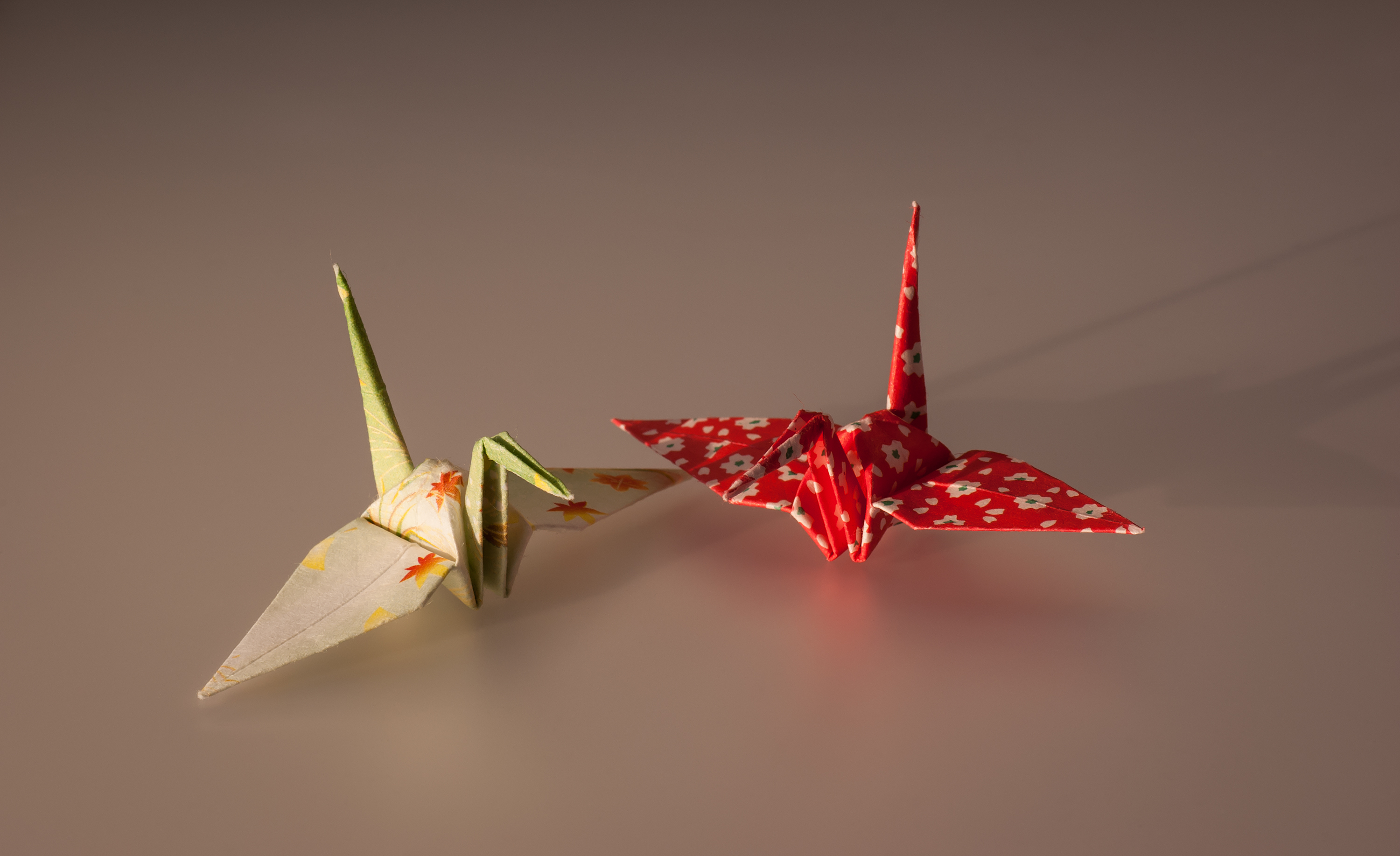|
Quaq Quao
Quaq Quao is an Italian animated television series for children based on the adventures of a duck. The series consisted of 26 episodes of five to six minutes duration. It was filmed using stop-motion with origami figures and was written and directed by Francesco Misseri with music by Piero Barbetti. It was first broadcast in Italy in 1980, but as early as 1976 in other countries. Plot Each episode is formulaic and has almost exactly the same plot. Quaq Quao is a white origami duck with a yellow beak. He is young, adventurous and a little bit cheeky. Quaq Quao has a brief interaction with his mother, a larger version of himself, which seems to be a lesson, as he repeats the actions and quacks of his mother. He bids her farewell and heads off on his own for the day. He sings the Quaq Quao theme song and performs acrobatics in the water, generally having a good time before he meets the guest creature for the episode. The creature is usually another animal, although four of the cr ... [...More Info...] [...Related Items...] OR: [Wikipedia] [Google] [Baidu] |
Animated Television Series
An animated series is a set of animated works with a common series title, usually related to one another. These episodes should typically share the same main characters, some different secondary characters and a basic theme. Series can have either a finite number of episodes like a miniseries, a definite end, or be open-ended, without a predetermined number of episodes. They can be broadcast on television, shown in movie theatres, released direct-to-video or on the internet. Like other television series, films, including animated films, animated series can be of a wide variety of genres and can also have different demographic target audiences, from males to females ranging children to adults. Television Animated television series are regularly presented and can appear as much as up to once a week or daily during a prescribed time slot. The time slot may vary including morning, like saturday-morning cartoons, prime time, like prime time cartoons, to late night, like la ... [...More Info...] [...Related Items...] OR: [Wikipedia] [Google] [Baidu] |
Stop-motion
Stop motion is an animated filmmaking technique in which objects are physically manipulated in small increments between individually photographed frames so that they will appear to exhibit independent motion or change when the series of frames is played back. Any kind of object can thus be animated, but puppets with movable joints (puppet animation) or plasticine figures (''clay animation'' or claymation) are most commonly used. Puppets, models or clay figures built around an armature are used in model animation. Stop motion with live actors is often referred to as pixilation. Stop motion of flat materials such as paper, fabrics or photographs is usually called cutout animation. Terminology The term "stop motion", relating to the animation technique, is often spelled with a hyphen as "stop-motion". Both orthographical variants, with and without the hyphen, are correct, but the hyphenated one has a second meaning that is unrelated to animation or cinema: "a device for automa ... [...More Info...] [...Related Items...] OR: [Wikipedia] [Google] [Baidu] |
Origami
) is the Japanese art of paper folding. In modern usage, the word "origami" is often used as an inclusive term for all folding practices, regardless of their culture of origin. The goal is to transform a flat square sheet of paper into a finished sculpture through folding and sculpting techniques. Modern origami practitioners generally discourage the use of cuts, glue, or markings on the paper. Origami folders often use the Japanese word ' to refer to designs which use cuts. On the other hand, in the detailed Japanese classification, origami is divided into stylized ceremonial origami (儀礼折り紙, ''girei origami'') and recreational origami (遊戯折り紙, ''yūgi origami''), and only recreational origami is generally recognized as origami. In Japan, ceremonial origami is generally called "origata" ( :ja:折形) to distinguish it from recreational origami. The term "origata" is one of the old terms for origami. The small number of basic origami folds can be combin ... [...More Info...] [...Related Items...] OR: [Wikipedia] [Google] [Baidu] |
Bugbear
A bugbear is a legendary creature or type of hobgoblin comparable to the boogeyman (or bugaboo or babau or cucuy), and other creatures of folklore, all of which were historically used in some cultures to frighten disobedient children. Etymology Its name is derived from the Middle English word "bugge" (a frightening thing), or perhaps the Old Welsh word ''bwg'' (evil spirit or goblin), or Old Scots ''bogill'' (goblin), and cognates most probably English "bogeyman" and "bugaboo". In medieval England, the bugbear was depicted as a creepy bear that lurked in the woods to scare children. It was described in this manner in ''The Buggbears'', an adaptation, with additions, from Antonio Francesco Grazzini’s ''La Spiritata'' (‘The Possessed oman��, 1561). In a modern context, the term ''bugbear'' may also mean pet peeve. In popular culture Bugbears appear in a number of modern fantasy literature and related media, where they are usually minor antagonists. They also appear as monst ... [...More Info...] [...Related Items...] OR: [Wikipedia] [Google] [Baidu] |
1970s Animated Television Series
Year 197 ( CXCVII) was a common year starting on Saturday (link will display the full calendar) of the Julian calendar. At the time, it was known as the Year of the Consulship of Magius and Rufinus (or, less frequently, year 950 '' Ab urbe condita''). The denomination 197 for this year has been used since the early medieval period, when the Anno Domini calendar era became the prevalent method in Europe for naming years. Events By place Roman Empire * February 19 – Battle of Lugdunum: Emperor Septimius Severus defeats the self-proclaimed emperor Clodius Albinus at Lugdunum (modern Lyon). Albinus commits suicide; legionaries sack the town. * Septimius Severus returns to Rome and has about 30 of Albinus's supporters in the Senate executed. After his victory he declares himself the adopted son of the late Marcus Aurelius. * Septimius Severus forms new naval units, manning all the triremes in Italy with heavily armed troops for war in the East. His soldiers embark ... [...More Info...] [...Related Items...] OR: [Wikipedia] [Google] [Baidu] |
Italian Children's Animated Television Series
Italian(s) may refer to: * Anything of, from, or related to the people of Italy over the centuries ** Italians, an ethnic group or simply a citizen of the Italian Republic or Italian Kingdom ** Italian language, a Romance language *** Regional Italian, regional variants of the Italian language ** Languages of Italy, languages and dialects spoken in Italy ** Italian culture, cultural features of Italy ** Italian cuisine, traditional foods ** Folklore of Italy, the folklore and urban legends of Italy ** Mythology of Italy, traditional religion and beliefs Other uses * Italian dressing, a vinaigrette-type salad dressing or marinade * Italian or Italian-A, alternative names for the Ping-Pong virus, an extinct computer virus See also * * * Italia (other) * Italic (other) * Italo (other) * The Italian (other) * Italian people (other) Italian people may refer to: * in terms of ethnicity: all ethnic Italians, in and outside of Italy * ... [...More Info...] [...Related Items...] OR: [Wikipedia] [Google] [Baidu] |
Fictional Ducks
Fiction is any creative work, chiefly any narrative work, portraying individuals, events, or places that are imaginary, or in ways that are imaginary. Fictional portrayals are thus inconsistent with history, fact, or plausibility. In a traditional narrow sense, "fiction" refers to written narratives in prose often referring specifically to novels, novellas, and short stories. More broadly, however, fiction encompasses imaginary narratives expressed in any medium, including not just writings but also live theatrical performances, films, television programs, radio dramas, comics, role-playing games, and video games. Definition Typically, the fictionality of a work is publicly marketed and so the audience expects the work to deviate in some ways from the real world rather than presenting, for instance, only factually accurate portrayals or characters who are actual people. Because fiction is generally understood to not fully adhere to the real world, the themes and context of ... [...More Info...] [...Related Items...] OR: [Wikipedia] [Google] [Baidu] |



